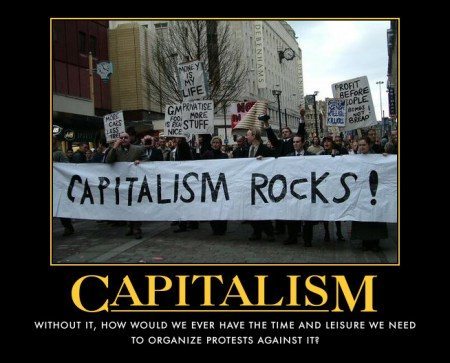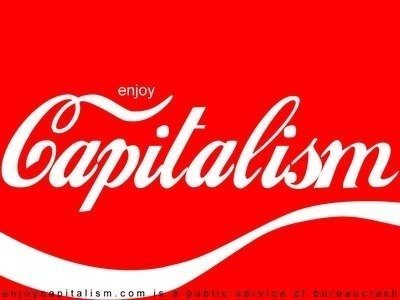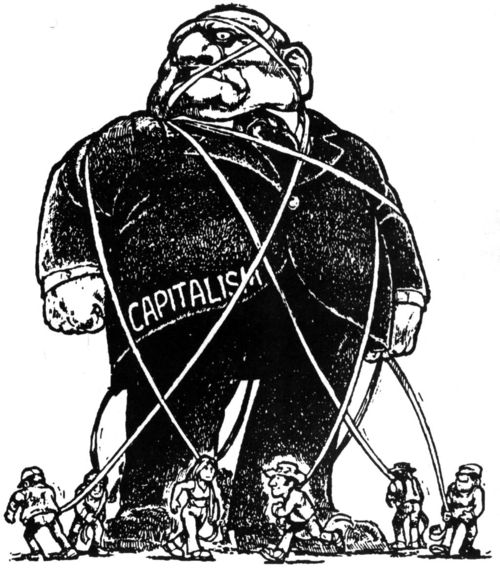
It’s Davos time, as usual.
In the last week of January, the great and the good of the world’s leadership from governments, business, academia and media all gather in Switzerland to debate the future of the world’s economies and the World Economic Forum, #WEF.
In the build-up to this year’s WEF, it seems that all the magazines, media and men are talking about capitalism, what capitalism means post-crisis and what the future of capitalism will be.
David Cameron made a speech about this last week, as did Nick Clegg and Ed Miliband, and much of the debate resonates with the speech of Amartya Sen that I attended last week.
The core of the debate is embodied in the quote by Winston Churchill that “capitalism is the worst form of economics, except for all the others that have been tried.”

Link: TrogloPundit
True.
The debate is then what form of capitalism you want: state capitalism or liberal capitalism.
A wholly state run economy fails, as demonstrated by communism; whilst a wholly liberalised, free market economy also fails, as demonstrated in 2008.
So there needs to be a middle ground, but how middling is that middle ground?
Somewhere between the extremes of Western and Eastern approaches to commerce.
Some believe that the West is crumbling due to over-excessive free market liberalism.
In a 2011 report, the Organisation for Economic Co-operation and Development figured that the level of income inequality in the 22 member nations it studied increased by 10% since the mid-1980s, with conditions deteriorating in 17 of them.
A recent report by the Institute for Policy Studies, a Washington-based think tank, found that CEOs at large U.S. firms earned, on average, $10.8 million in 2010, a 28% increase from the year before, while the average worker took home $33,121, a mere 3% more. At that level, CEOs’ paychecks are 325 times bigger than their employees’. In the 1970s, CEO pay rarely topped 30 times more.
Meanwhile, the average income for an American has reduced every year for the past three years.
On the other extreme, Asian markets are rising fast and taking over, using a more state-led capitalistic approach.
“The world’s ten biggest oil-and-gas firms, measured by reserves, are all state-owned … state-backed companies account for 80% of the value of China’s stockmarket and 62% of Russia’s.” [The Economist]
“The ten largest economies in Asia now spend roughly $400 billion a year on research and development (R&D)—as much as America, and well ahead of Europe’s $300 billion. China’s investment leapt 28% in a year, propelling it past Japan to become the world’s second-biggest spender … America’s share of global R&D spending is falling. In the decade to 2009, it tumbled from 38% to 31%, whereas Asia’s rose from 24% to 35%. But science is not a zero-sum game.” [The Economist]
So there is a new model rising which, according to Time Magazine, “is not so much between capitalism and another ideology but between competing forms of capitalism. The financial crisis, growing inequality and faltering economic performance in the U.S. have tarnished American ‘leave it to the markets’ capitalism, which is being challenged by ‘capitalism with Chinese characteristics’, eurocapitalism, ‘democratic development capitalism’ (India and Brazil) and even small-state entrepreneurial capitalism (Singapore, UAE and Israel). All these models favour a more significant role for the state in regulation, ownership and control of assets.”
The Economist furthers this debate, asserting that the winner is ‘state capitalism’.

Link: Ifyouhavetoaskyoudontknow
“The crisis of liberal capitalism has been rendered more serious by the rise of a potent alternative: state capitalism, which tries to meld the powers of the state with the powers of capitalism. It depends on government to pick winners and promote economic growth. But it also uses capitalist tools such as listing state-owned companies on the stockmarket and embracing globalisation.”
Examples of state capitalism include:
“The 13 biggest oil firms, which between them have a grip on more than three-quarters of the world’s oil reserves, are all state-backed including the world’s biggest natural-gas company, Russia’s Gazprom, China Mobile and Saudi Basic Industries Corporation is one of the world’s most profitable chemical companies. Russia’s Sberbank is Europe’s third-largest bank by market capitalisation. Dubai Ports is the world’s third-largest ports operator. The airline Emirates is growing at 20% a year ... State companies make up 80% of the value of the stockmarket in China, 62% in Russia and 38% in Brazil. They accounted for one-third of the emerging world’s foreign direct investment between 2003 and 2010 and an even higher proportion of its most spectacular acquisitions, as well as a growing proportion of the very largest firms: three Chinese state-owned companies rank among the world’s ten biggest companies by revenue, against only two European ones.” [The Economist]
“State-Owned Enterprises (SOEs) make up most of the market capitalisation of China’s and Russia’s stockmarkets and account for 28 of the emerging world’s 100 biggest companies.” [The Economist]
“France owns 85% of EDF, an energy company; Japan 50% of Japan Tobacco; and Germany 32% of Deutsche Telekom. These numbers add up: across the OECD state-owned enterprises have a combined value of almost $2 trillion and employ 6m people.” [The Economist]
The Economist believes the trend for the next decade will be towards state capitalism based upon the Chinese model, albeit with caveats and issues along the way, and concludes that “the Chinese no longer see state-directed firms as a way-station on the road to liberal capitalism; rather, they see it as a sustainable model. They think they have redesigned capitalism to make it work better, and a growing number of emerging-world leaders agree with them. The Brazilian government, which embraced privatisation in the 1990s, is now interfering with the likes of Vale and Petrobras, and compelling smaller companies to merge to form national champions. South Africa is also flirting with the model:
- Over the past 30 years China’s GDP has grown at an average rate of 9.5% a year and its international trade by 18% in volume terms. Over the past ten years its GDP has more than trebled to $11 trillion.
- China has taken over from Japan as the world’s second-biggest economy, and from America as the world’s biggest market for many consumer goods.
- The Chinese state is the biggest shareholder in the country’s 150 biggest companies.
- China’s 121 biggest SOEs saw their total assets increase from $360 billion in 2002 to $2.9 trillion in 2010 … in 2009 some 85% of China’s $1.4 trillion in bank loans went to state companies.”
But note that, unlike America where CEOs’ paychecks are 325 times bigger than their employees, state capitalism is fairer in terms of income disparities: “in 2009 the average SOE boss earned $88,000 and the highest-paid, the chairman of China Mobile, $182,000.” [The Economist] China Mobile has 600 million customers and is one of the largest telecoms in the world.
FYI, I debated these points a couple of years ago, and concluded that the future is one where capitalism is heavily influenced by the influence of the Chinese and Islamic principles.
Seems to be coming true?

Link: The World Is Not Enough
Postnote:
The main reading behind this blog post is inspired by two cover page stories:
- How to Save Capitalism, Time Magazine
- State Capitalism, Economist supplement
Chris M Skinner
Chris Skinner is best known as an independent commentator on the financial markets through his blog, TheFinanser.com, as author of the bestselling book Digital Bank, and Chair of the European networking forum the Financial Services Club. He has been voted one of the most influential people in banking by The Financial Brand (as well as one of the best blogs), a FinTech Titan (Next Bank), one of the Fintech Leaders you need to follow (City AM, Deluxe and Jax Finance), as well as one of the Top 40 most influential people in financial technology by the Wall Street Journal's Financial News. To learn more click here...

